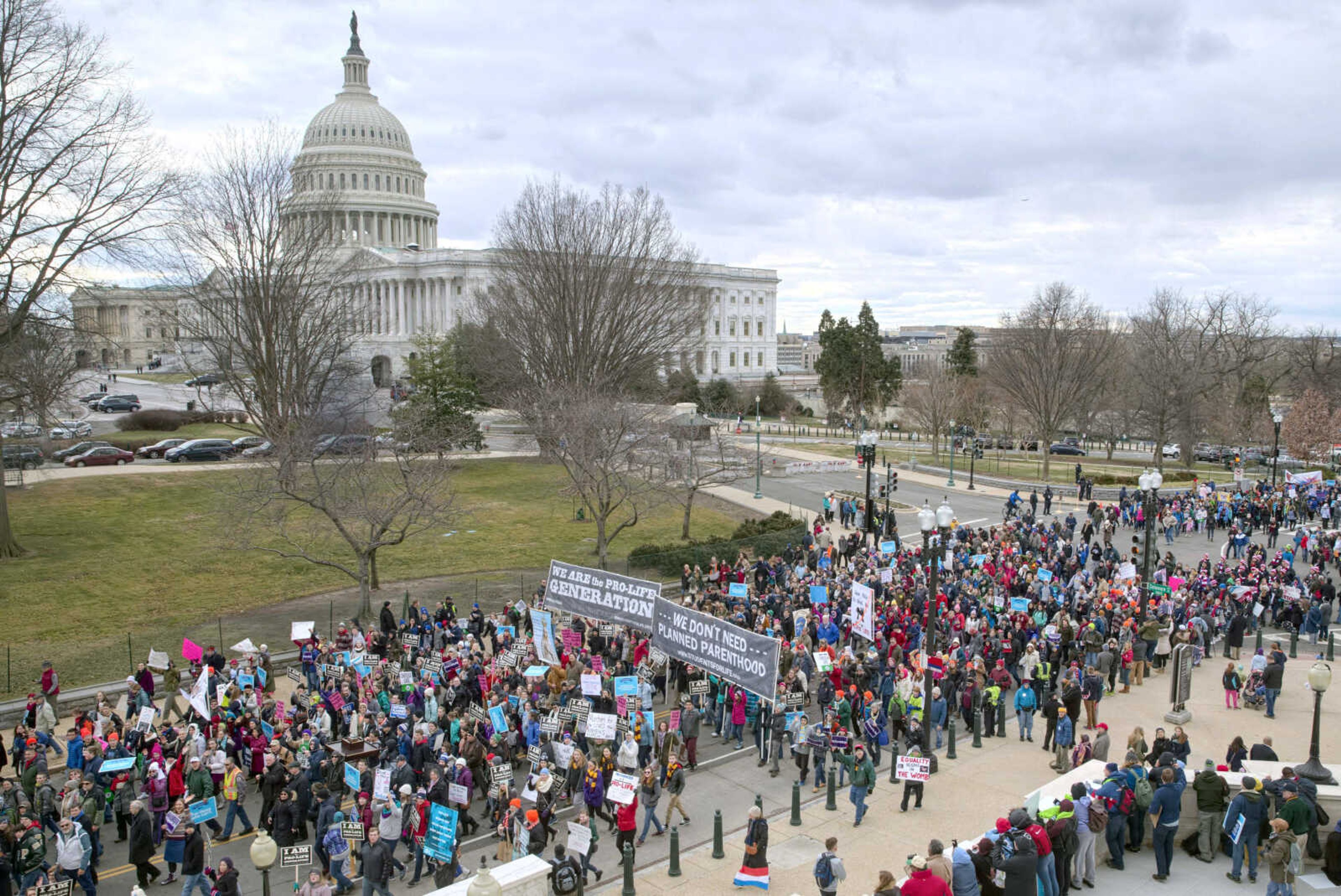For rival camps in abortion debate, a weekend to mobilize
Activists on both sides of the abortion debate will be rallying and marching over the next few days in their annual show of force, while looking ahead to the coming year with a mix of combativeness and trepidation. The events kick off today with the March for Life in Washington, the biggest yearly event for opponents of abortion. Organizers say Donald Trump will become the first sitting president to address the gathering, speaking live from the White House Rose Garden...
Activists on both sides of the abortion debate will be rallying and marching over the next few days in their annual show of force, while looking ahead to the coming year with a mix of combativeness and trepidation.
The events kick off today with the March for Life in Washington, the biggest yearly event for opponents of abortion. Organizers say Donald Trump will become the first sitting president to address the gathering, speaking live from the White House Rose Garden.
Abortion-rights supporters plan a counter-protest today at the Supreme Court, followed by other weekend events marking Monday's 45th anniversary of the high court's Roe v. Wade decision legalizing abortion nationwide. Abortion-rights leaders also will have major roles in many of the women's marches planned around the country Saturday and Sunday; for example, Planned Parenthood president Cecile Richards will be a featured speaker at a major rally in Las Vegas.
Richards, in a news briefing this week, said Planned Parenthood and its allies are eyeing November's elections as a chance to strengthen the abortion-rights cause both in Congress and at the state level.
"Any way you spin it, women have become the most potent political force in this country," she said.
While the Democratic Party, which supports abortion rights, is confident of substantial gains in the election, some Republican legislators are wary of wading into the abortion debate and other hot-button social issues during the 2018 sessions that began this month in statehouses nationwide.
In Indiana, for example, anti-abortion activists have been attacking GOP House Speaker Brian Bosma for what they perceive as lack of interest in tough new anti-abortion measures. In Wisconsin, GOP Assembly Speaker Robin Vos has told anti-abortion groups there aren't enough votes to pass measures they favor that would limit or ban research involving fetal tissue obtained from abortions.
In Virginia, where Democrats recently gained many seats in the legislature's lower chamber, GOP lawmakers have been more reluctant than usual to introduce anti-abortion bills this year. And the state's new Democratic governor, Ralph Northam, is advocating a progressive agenda that would include protecting abortion rights.
Jim Daly, president of the conservative Christian group Focus on the Family, said he wouldn't be surprised if some state GOP leaders opted to shy away from abortion and other social issues in an election year. But he suggested those who acted boldly would win the gratitude and votes of social conservatives.
In Ohio, that's been the case this month: the GOP-controlled Senate already approved a bill requiring the burial or cremation of fetal remains after an abortion. Democratic senators and abortion-rights groups say the bill is another of many attempts in Ohio to impede women from seeking legal abortions.
According to advocacy groups, GOP-controlled legislatures have passed roughly 400 bills since 2011 aimed at reducing abortion access, including about 60 measures in 2017.
From the other flank, abortion-rights supporters in Democratic-governed states have become more active in pushing for legislation that protects abortion access and expands availability of birth control.
Last year, Oregon enacted a law ensuring insurance coverage for a full range of reproductive health services, including abortion, while Illinois restored coverage for abortion for state employees and residents who qualify for Medicaid. Earlier this month, more than 200 legislators from 40 states forced the Reproductive Freedom Leadership Council to promote other reproductive-rights initiatives.
In Congress, many Republicans would like to pass tough anti-abortion measures, such as a ban on abortions after 20 weeks of pregnancy. But with the recent win by Democrat Doug Jones, an abortion-rights supporter, in Alabama's U.S. Senate election, the GOP has only a 51-49 edge in the Senate and no realistic chance of passing anti-abortion measures that under Senate rules would require 60 votes.
Because of those dynamics in Congress, both camps in the abortion debate expect the Trump administration to take up the slack, issuing executive orders and implementing policies that potentially would limit abortion access. On Thursday, for example, the administration announced new steps to protect health-care providers who have religious objections to various types of procedures, including abortion.
In addition to Trump, featured speakers at today's March for Life include GOP House Speaker Paul Ryan and U.S. Rep. Dan Lipinski of Illinois, one of the few Democrats in Congress who consistently supports anti-abortion measures. Lipinski, a seven-term incumbent, is facing perhaps his toughest primary challenge this year from Marie Newman, an abortion-rights supporter.
Connect with the Southeast Missourian Newsroom:
For corrections to this story or other insights for the editor, click here. To submit a letter to the editor, click here. To learn about the Southeast Missourian’s AI Policy, click here.










